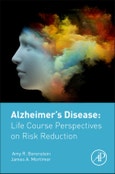Nearly 44 million people have Alzheimer's or related dementia worldwide, according to the Alzheimer's Disease International organization. That number is expected to double every 20 years. Unlike other books on the market, Alzheimer's Disease: Understanding Biomarkers, Big Data, and Therapy covers recent advancements in cognitive, clinical, neural, and therapeutic aspects of Alzheimer's and other forms of dementia.
First, readers are introduced to cognitive and clinical studies, focusing on the different types of memory impairment, past and future thinking. This includes the prevalence of depression, its relationship to other symptoms, and the quality of life for those with Alzheimer's disease. In addition, the book discusses recent studies on memory dysfunction in advanced-stage Alzheimer's disease, in comparison to early-stage, including a chapter on the underlying factors in the transition from mild cognitive impairment to Alzheimer's diagnosis. Following this section, the book presents recent studies on the role of different cortical and subcortical structures in the development of various symptoms in Alzheimer's disease, as well as different neural biomarkers underlying the development and treatment of the disease. In the last section of the book, therapeutic aspects of Alzheimer's disease, focusing on behavioral and pharmacological treatments of sleep disorders, memory problems, and depression, are reviewed. The book aids readers in understanding the advances in research and care, making it a prime tool for all clinicians, psychologists, researchers, neurologists, and caregivers of dementia patients.
Please Note: This is an On Demand product, delivery may take up to 11 working days after payment has been received.
Table of Contents
Part I: Mental Health in Dementia1. Measures of depression in Alzheimer's disease
Ahmed A. Moustafa, Wafa Jaroudi, Lily Bilson and Mohamad El Haj
2. The nature of depression in dementia: A narrative review
Ahmed A. Moustafa, Phoebe Bailey, Wafa Jaroudi, Lily Bilson and Mohamad El Haj
3. Stress and anxiety in dementia
Ahmed A. Moustafa, Shimaa Adel Heikal and Wafa Jaroudi
Part II: Advanced Topics in Dementia Research
4. Alzheimer's disease in the pupil: Pupillometry as a biomarker of cognitive processing in Alzheimer's Disease
Ahmed A. Moustafa and Mohamad El Haj
5. Cognitive and neural correlates of vitamin D deficiency: Focus on healthy aging and Alzheimer's Disease
Ahmed A. Moustafa, Wafa Jaroudi and Abdrabo Soliman
6. The effect of Alzheimer's Disease on the thalamus
Ahmed A. Moustafa and Rasu Karki
7. Using big data methods to understand Alzheimer's Disease
Ahmed A. Moustafa, Samuel L. Warren and Hany Alashwal
8. Operational aspects of deep learning solutions for Alzheimer's Disease
Ahmed A. Moustafa, Dustin van der Haar and Samuel L. Warren
Part III: Treatment of Dementia
9. Treatment of depression in Alzheimer's Disease
Ahmed A. Moustafa, Lily Bilson and Wafa Jaroudi
10. Developing a vulnerability to negative affect scale for music interventions for people with dementia
Ahmed A. Moustafa, Sandra Garrido and Wafa Jaroudi
11. Using music to improve mental health in people with dementia
Ahmed A. Moustafa, Wafa Jaroudi and Sandra Garrido
12. The efficacy of Donepezil for the treatment of Alzheimer's Disease
Ahmed A. Moustafa and Samuel L. Warren








